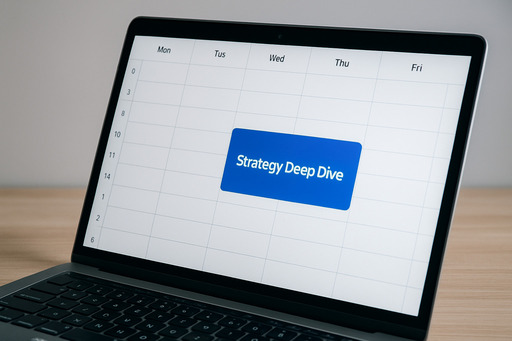 Every business leader says they want to be more strategic. But most never get there. Not because they lack insight or ambition—but because they lack the one thing strategy needs most: deep work.
Every business leader says they want to be more strategic. But most never get there. Not because they lack insight or ambition—but because they lack the one thing strategy needs most: deep work.
What is Deep Work and Why Does it Matter for Strategy?
Deep work, a term popularised by Cal Newport, is the ability to focus without distraction on a cognitively demanding task. It’s the state in which your brain produces your best thinking, clearest decisions, and most original ideas.
In the context of business strategy, deep work is mission-critical. It's how you:
-
Cut through complexity to see the signal in the noise.
-
Spot patterns, trends, and anomalies others miss.
-
Evaluate trade-offs and second-order consequences.
-
Craft bold, coherent strategies that guide real action.
Strategic decisions are rarely black and white. They require navigating ambiguity, synthesising disparate data points, and forecasting uncertain futures. That kind of thinking doesn’t happen in a 15-minute gap between meetings.
“90 minutes of deep work can yield more strategic insight than a week of shallow tasks.”
Deep work enables:
-
Clarity in complexity
-
Original, structured thinking
-
Repeatable strategic frameworks
-
Execution that scales
It's not a luxury. It's a lever for high-leverage thinking.
Why Business Leaders Struggle to Do Deep Work
If deep work is so valuable, why do so few leaders make time for it?
Because everything about the modern work environment is designed to prevent it.
Constant Digital Distraction
Executives are bombarded with Slack messages, email pings, and meeting invites. According to McKinsey, the average professional spends 28% of their work day reading and answering emails. Other research shows that Executives spend an average of 23 hours a week in meetings, with 71% of senior managers saying meetings are unproductive and inefficient. (For a remedy to this malaise, see: The Power of Strategy: Unleashing Growth Through Effective Meetings)
A research study from the University of California at Irvine found that:
- in only 77% of cases is interrupted work resumed on the same day, and where it is,
- it usually takes more than 25 minutes to resume it,
- after they've worked on 2.26 other tasks.
Reactive Culture
In many organisations, being busy is a badge of honour. Leaders are rewarded for quick responses, not deep insights. Urgent trumps important. This creates a loop of shallow work and strategic drift.
No Time for Thinking
Leaders fill their calendars with calls and updates but rarely schedule thinking time. Strategic work gets squeezed into the margins—if at all.
Poor Cognitive Environment
Many leaders operate in a state of:
-
Decision fatigue
-
Sleep deprivation
-
Constant context switching
All of which degrade the cognitive conditions needed for deep work.
No Strategic System
Even when leaders carve out time, they often face a blank page. Without structured tools or frameworks, deep thinking stalls.
That’s where a platform like StratNavApp.com makes a difference. It guides strategic thinking step-by-step, allowing leaders to focus deeply within a proven framework.
Why Deep Work Matters Specifically for You
For Consultants
Deep work enables you to build repeatable and scalable processes for supporting clients in developing and executing business strategy. It powers:
-
Deep diagnostic reviews
-
Customised frameworks that go beyond templates
-
Thought leadership that differentiates
For Corporate C-Suite Executives
You need structured decision-making, long-term vision, and enterprise-level execution. Deep work gives you the clarity and bandwidth to:
-
Align teams around coherent strategic goals
-
Evaluate M&A, market entry, and transformation initiatives
-
Resist knee-jerk reactions to market noise
For Startup Founders
You live in pivot mode. But even agility needs focus. Deep work enables you to:
-
Refine your value proposition
-
Make bold bets grounded in data
-
Scale processes without losing strategic alignment
6 Steps to Make Deep Work a Strategic Habit
You can reclaim your capacity for deep work. Here’s how to build it into your strategic rhythm:
Schedule Deep Work Like a Board Meeting
Block 90–120 minutes for uninterrupted thinking. Make it sacrosanct. Label it clearly (e.g., “Strategy Deep Dive”) and don’t allow interruptions.
If it’s not scheduled, it won’t happen.
Eliminate Distractions
Turn off notifications. Use website blockers (like Freedom or Cold Turkey). Put your phone out of reach. Create a physical and digital environment that supports focus.
You can’t go deep if you're half-scrolling LinkedIn or checking your inbox.
Use Strategic Frameworks
Don’t go it alone. Tools like StratNavApp.com provide structure, templates, and prompts to keep your deep work focused and productive.
Think of it as your “deep work assistant” for strategy.
Run Strategy Sprints
Once a quarter, block out a half-day to:
-
Review assumptions
-
Reassess priorities
-
Refresh your business model
Make it a ritual, not a rescue mission.
Train Focus Like a Muscle
Build up your deep work endurance. Start with 30-minute blocks. Reduce multitasking. Practice mindfulness to sharpen attention.
Focus is finite. Protect it.
Model It for Your Team
Your culture follows your calendar. If you protect time for strategic thinking, your team will too. Reward deep insight over instant response.
Build organisational support:
-
Set norms for "no meeting" blocks
-
Celebrate well-reasoned strategic decisions
-
Foster a culture where focus and reflection are valued
Final Thoughts
Deep work is not about working harder. It's about thinking deeper. It's the competitive advantage that can't be outsourced, automated, or commoditised.
If you want to elevate your strategy game, start by reclaiming your ability to focus.
